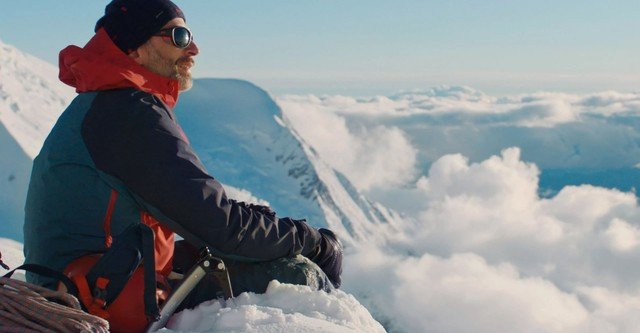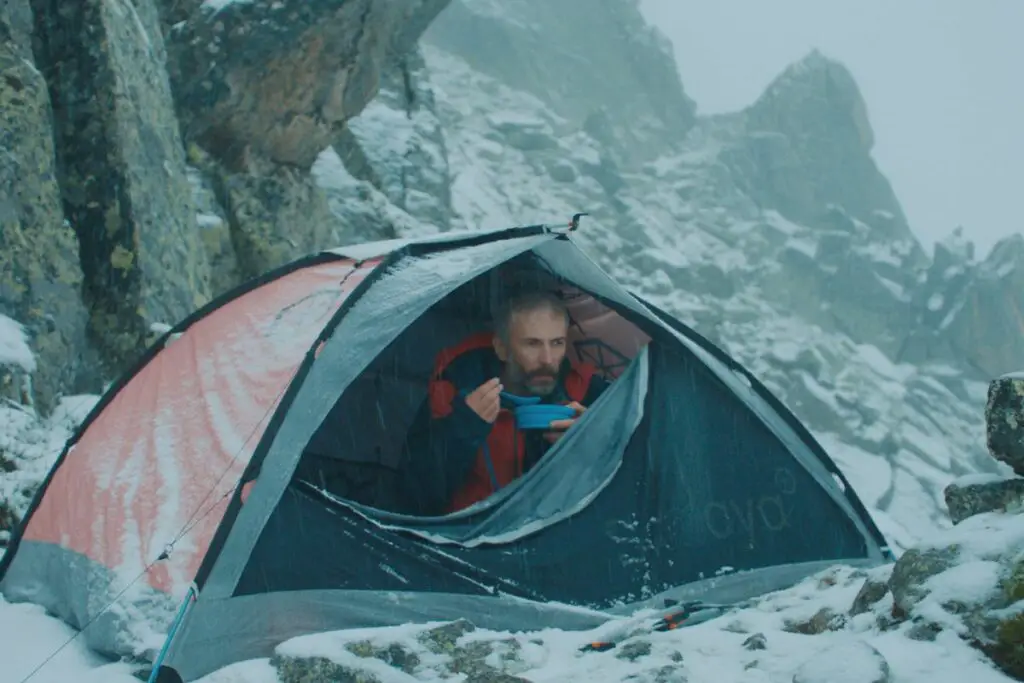In an era dominated by fast-paced, action-packed films, “The Mountain,” directed by and starring Thomas Salvador, emerges as a cinematic masterpiece that invites viewers to slow down, appreciate the profound beauty of nature, and embark on an introspective journey alongside its enigmatic protagonist, Pierre.
This critique will delve deep into the essence of “The Mountain,” exploring its unique narrative, breathtaking visuals, and the profound impact it can have on those willing to surrender to its mesmerizing rhythms.
Setting the Stage
“The Mountain” begins by immersing the audience in the mundane yet meticulously detailed life of Pierre, portrayed by the multi-talented Thomas Salvador himself. Pierre is a middle-aged man with salt-and-pepper hair, residing in a typical French apartment. The film takes its time to establish this character and his daily routine, a deliberate choice that prepares the audience for the extraordinary journey that lies ahead.
Pierre’s morning ritual involves sipping espresso, washing a mustard-colored ceramic cup, and leaving it to dry upside down near his kitchen sink. This seemingly ordinary act is a precursor to the film’s central themes—time, routine, and the human desire to break free from the constraints of a conventional life.
A Glimpse of Modern Life
As the narrative unfolds, we follow Pierre on a train ride with his work colleagues to an industrial park nestled in the awe-inspiring Alps. It’s here that Pierre presents his company’s latest creation—a robotic kitchen aid.
This introduction to his work life subtly juxtaposes the modern, mechanical world against the timeless and majestic backdrop of the mountains, setting the stage for the film’s exploration of contrasting realities.
The allure of the mountains begins to captivate Pierre. After his colleagues depart, he makes a life-altering decision to extend his stay. This moment marks the beginning of his transformational journey, one that will force him to confront the boundaries of societal norms and expectations.
Embracing Nature’s Majesty
Pierre’s decision to stay in the mountains prompts him to buy a tent and explore the slopes on skis. His campsite, set against the backdrop of Chamonix-Mont Blanc, becomes a visual representation of his quest for freedom and connection with the natural world.
Pierre’s character exudes calm and self-assuredness, qualities that will serve him well in his ascent to a new life.
“The Mountain” distinguishes itself through its ability to draw viewers into Pierre’s world, compelling them to feel the passing of time and the profound impact of nature on the human spirit. Pierre’s deliberate abandonment of his previous life is both courageous and enigmatic, marking a departure from the typical narratives of societal conformity.
A Surreal Transformation
As Pierre’s journey continues, he forms unexpected connections with fellow mountain enthusiasts, challenging societal norms by setting up camp in areas that caution against it.
The film refrains from providing explicit philosophical or ecological reasons for Pierre’s choices, leaving ample room for interpretation. This deliberate ambiguity invites viewers to contemplate the deeper motivations behind Pierre’s transformation.
The arrival of Pierre’s mother and two brothers introduces a familial conflict that adds depth to the narrative. Marc, one of Pierre’s brothers, grapples with anger and concern over Pierre’s unconventional path.
Their interactions provide a human touch to the story, portraying the complexities of family dynamics when confronted with radical life choices. Pierre’s nonchalant response, stating he has money saved, reflects his unwavering commitment to his newfound way of life.
Salvador’s refusal to offer a clear rationale for Pierre’s actions mirrors the film’s overall theme of embracing the unknown and challenging societal norms. “The Mountain” invites viewers to explore the idea that life can be lived differently, that one can choose to break free from the constraints of time and expectations without needing to justify themselves.

Defying Expectations
As the narrative unfolds, the film takes an unexpected turn, defying the audience’s initial expectations. While the setup suggests a potential “Into the Wild” scenario, Salvador masterfully guides the story toward a more surreal and metaphysical realm reminiscent of “Altered States.” Pierre’s solo expedition into a glacier crevasse sets in motion a sequence of events that transcend the boundaries of reality.
Visual Mastery and Evocative Score
Cinematographer Alexis Kavyrchine and composer Chloé Thévenin play pivotal roles in creating the film’s immersive experience. Kavyrchine’s visually stunning cinematography captures the raw beauty of the mountain landscape, evoking a sense of wonder and awe. Thévenin’s sparse yet evocative electronic score complements the imagery, enhancing the film’s enigmatic atmosphere.
The Essence of “The Mountain”
“The Mountain” is a cinematic journey that seeks to penetrate something elemental within the viewer. Salvador’s measured pacing and commitment to storytelling that challenges conventional norms may not resonate with all audiences. However, for those willing to embrace the film’s vision in good faith, it has the potential to inspire introspection and a renewed appreciation for the mysteries of the natural world.
Bottom Line
“The Mountain” is a thought-provoking and visually captivating film that defies genre conventions and invites viewers to embark on a contemplative journey. Thomas Salvador’s portrayal of Pierre’s transformation, coupled with the mesmerizing cinematography and haunting score, make “The Mountain” a cinematic experience that lingers in the mind long after the credits roll.
It challenges us to reconsider our own relationship with time, nature, and the possibilities that lie beyond the confines of societal expectations. For those seeking a cinematic escape from the ordinary, “The Mountain” offers a unique and compelling odyssey worth embarking upon. It is a testament to the power of cinema to transport us to worlds where time is no longer a constraint, and the beauty of nature reigns supreme.

